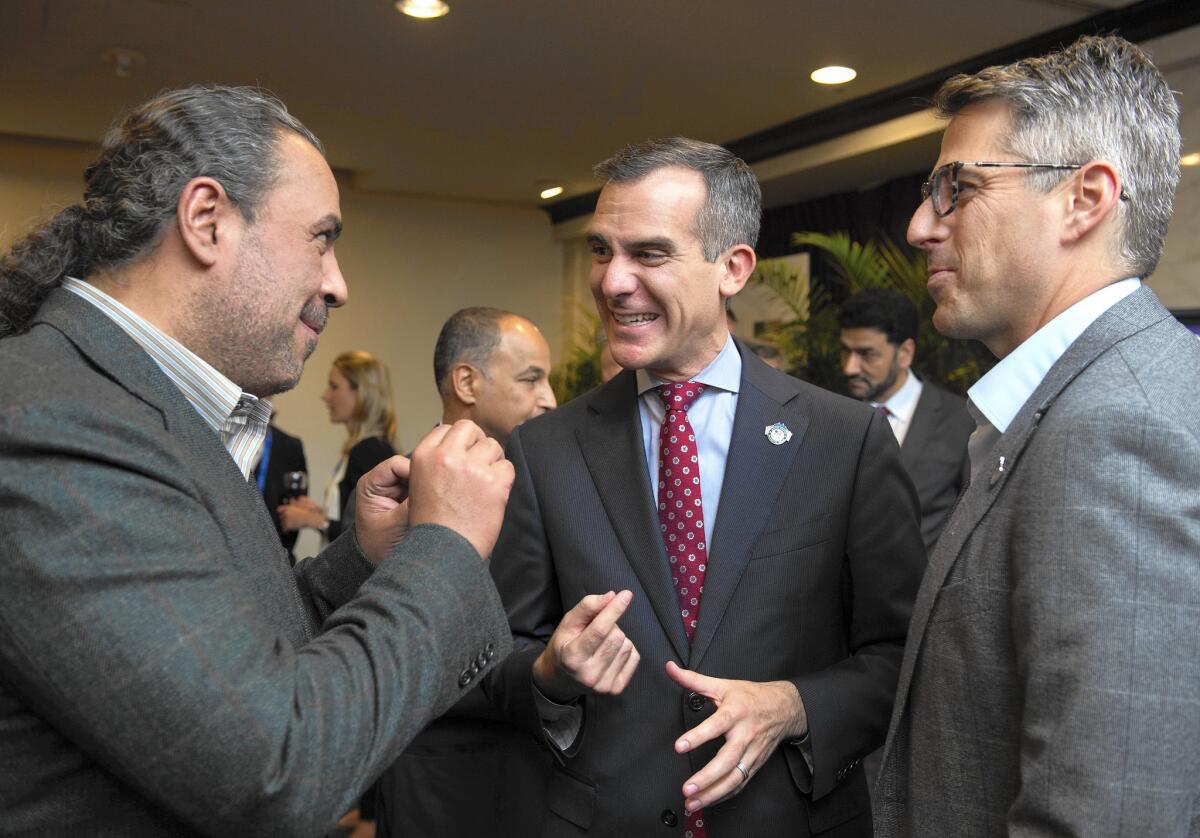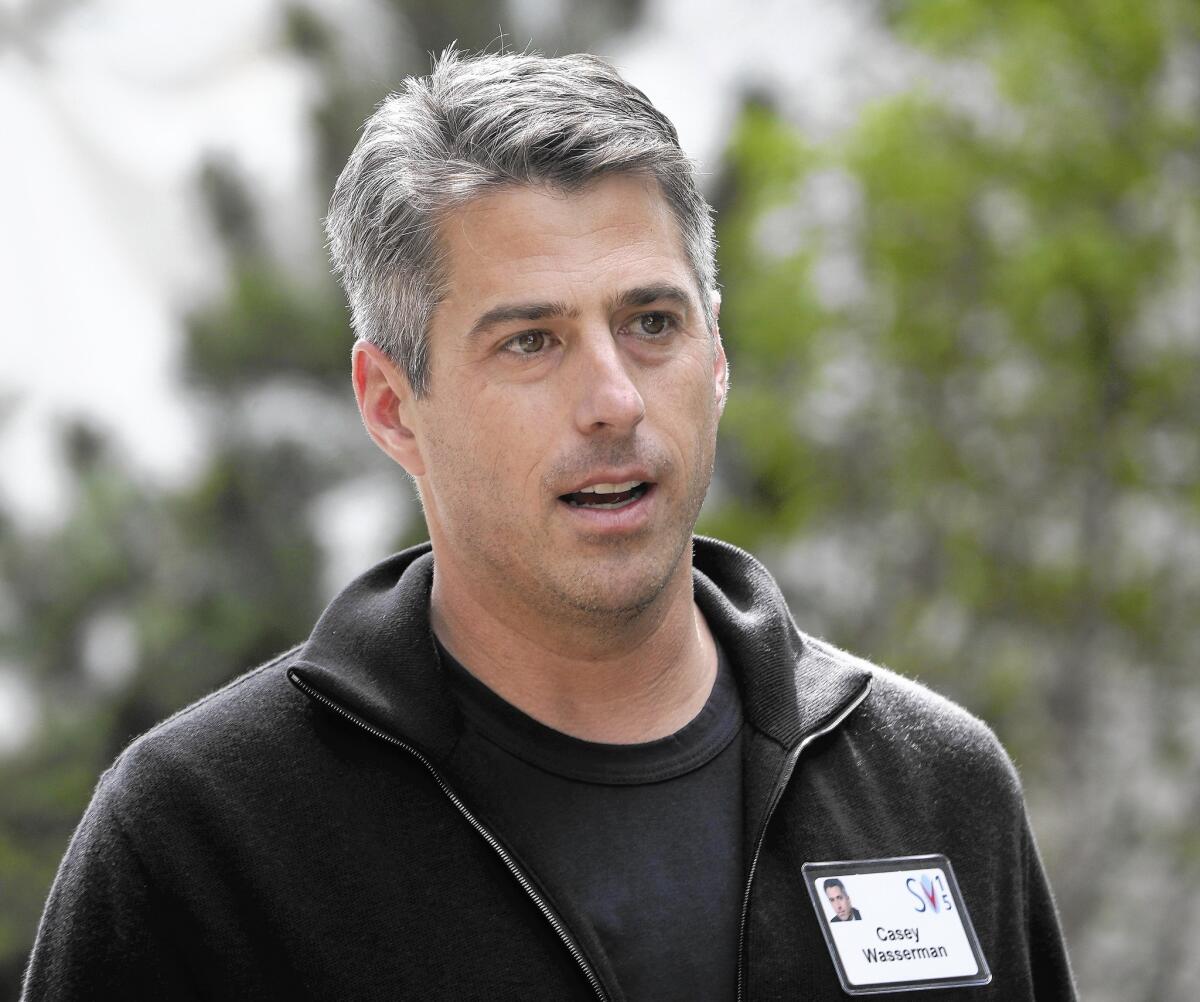Great Read: Casey Wasserman carries the torch to bring Olympics to L.A. in 2024

ANOC President Sheikh Ahmad Al-Fahad Al-Sabah, left, speaks with Casey Wasserman, LA 2024 Chairman, right, and Los Angeles Mayor Mayor Eric Garcetti, at the reception before the XX ANOC General Assembly 2015 on Oct. 27 in Washington, DC.
The glasses are unusually large and square, with thick, dark rims. Casey Wasserman keeps them in a display case behind the desk in his Westwood office.
They belonged to his grandfather, Lew Wasserman, the late studio boss often described as Hollywood’s last mogul before corporations took over.
“He’s always looking over my shoulder,” Casey says. “Making sure I’m doing the right thing.”
------------
FOR THE RECORD: A previous version of this article included Hamburg, Germany, among potential rivals for the Olympics. Hamburg is no longer among the contenders.
------------
For the last two decades, the younger Wasserman has worked to forge a name for himself apart from his familial connections, serving on influential boards across the city and building his management agency into a force in the sports industry.
His resume also includes some very public defeats with an arena football team that shut down after nine seasons and a failed attempt to build an NFL stadium downtown.
Now comes another challenge: Convincing Olympic officials that Los Angeles should host the 2024 Summer Games.
If Mayor Eric Garcetti is the face of the bid, Wasserman is the heart and soul, a 41-year-old wunderkind determined to bring the world’s grandest sporting event back to Southern California.
The LA 2024 bid has two years to make its case to the International Olympic Committee, a wildly diverse group of 100 or so members worldwide.
Some voters might have a lukewarm response to Los Angeles, which already hosted the Games in 1932 and 1984. Others might discount the city because it was the U.S. Olympic Committee’s second choice, put forward after a troubled Boston campaign withdrew.
If nothing else, there will be fierce opposition from rival candidates: Paris; Rome; and Budapest, Hungary.
The IOC can be finicky when choosing a host — its members are handing over the keys to their most-prized possession. A bid needs more than just plans on paper.
“It’s a matter of building up trust both home and abroad,” says Dick Pound, a longtime IOC member from Canada. “You do that one bite at a time, meeting with members and trying to engage them.”
Wasserman must find a way to win them over.
::
Dressed in a tailored suit with a white shirt open at the collar, Wasserman looked younger than his age mingling at a recent USOC assembly in Colorado Springs, Colo.
Olympic officials expressed surprise at his knowledge of their world. He credits his grandfather for teaching him to “anticipate.”
“Can’t be too prepared,” he says. “That drives me every day.”
His childhood qualifies as Hollywood folklore, with Lew playing the role of surrogate dad to a boy whose parents separated early on. Wealth was only part of the tale as Casey Myers — he later changed his name — remained estranged from his father.
At his maternal grandfather’s side, he met world leaders and industry titans and, because Lew loved sports, had special entre into that world too.
There was a summer vacation spent as ballboy for the Cleveland Browns and a chance to carry the Olympic torch before the 1984 Games. Each year, he attended Wimbledon along with sports agent Mark McCormack.
Growing up around Lew, Casey sat in all those rooms with all those people, with all those conversations. He was watching and learning.
— Skip Paul, a former board member of entertainment giant MCA
“Growing up around Lew, Casey sat in all those rooms with all those people, with all those conversations,” said Skip Paul, a former board member of entertainment giant MCA. “He was watching and learning.”
The movie business was never an option because, as Wasserman explains, “everything I would have done would have had a qualifier.”
In 2000, after earning a political science degree at UCLA and receiving a multimillion-dollar trust fund, the 25-year-old spent $5 million to launch an Arena Football League franchise.
It hurt to disband the Avengers amid league-wide turmoil in 2009, but the experience taught him much.
The Wasserman Media Group — founded in 2002, the year Lew died — grew with each sponsorship deal it negotiated and each athlete it signed as a client. Using a sketch on a napkin, Wasserman persuaded the entertainment company AEG to propose the Farmers Field NFL stadium.
Through it all, critics suggested he was merely cashing in on his grandfather’s name. Though flashes of Lew’s intensity — and infamous temper — occasionally surfaced, the grandson seemed laidback by comparison.
“Casey’s quiet about how he handles things,” says Antonio Villaraigosa, the former Los Angeles mayor. “But he can be assertive when he needs to be.”
Boyhood lessons stuck with him.
As the LA 2024 bid chairman, he has attended sports conventions in Washington and the Czech Republic, meetings at IOC headquarters in Switzerland and a wrestling championship in Las Vegas, traveling to wherever Olympic officials convene.
“My grandfather was a big believer in being present with people,” Wasserman says. “That was about building relationships.”
::
Nenad Lalovic knew the name but not much else.
A Google search might have turned up a few factoids: That GQ magazine once dubbed Wasserman the “kosher Kennedy” and that he played a round of golf with President Clinton and Tiger Woods.
Lalovic, the president of United World Wrestling federation, was curious when Wasserman arrived at his championship this fall.
The men spent an hour touring Orleans Arena, with Wasserman studying the configuration of changing rooms and warm-up areas. He wanted to show that if Los Angeles won the 2024 vote, wrestling would be provided for.
Olympic rules prohibit bid leaders from making specific pitches at this stage, so the conversation remained casual.
“You can feel the energy the guy has,” Lalovic says. “You can feel the dedication to sports.”
It was the sort of day USOC Chairman Larry Probst, who joined them, had wanted. He knew Lew and, as head of video-game maker Electronic Arts, had once hired a teenage Casey to work as a game tester over the summer.
“We sat down and had lunch,” Probst recalls of the meeting with Lalovic. “By the end, it seemed like they were starting to be friends.”

Entertainment executive Casey Wasserman during a break at the Allen and Company 33rd Annual Media and Technology Conference, in Sun Valley, Idaho in July.
Even with dozens of Olympians as clients, Wasserman is not widely known in that world. Nor is he a household name back home because — much like his grandfather — he has limited his interaction with the media.
Perhaps his strengths lie elsewhere.
Not long after Los Angeles replaced Boston, Tony Blair came through town. Wasserman counts the former British prime minister among his many acquaintances and spoke with Blair about London’s successful campaign.
At the same time, with LA 2024 needing money for its campaign, he turned to allies gained as president of his family’s charity.
The Wasserman Foundation has poured tens of millions into local causes, including public education and the arts. Wasserman began making calls and, within a week, helped raise $30 million.
“I hopefully have some personal capital built up with people,” he says. “They could tell this was important to me.”
::
Olympic politics can be unpredictable, with decisions made by an odd mix of bureaucrats, former athletes and royalty. That might test the patience of a man who likes to be in control.
Wasserman thought carefully before stepping into this world. Time was a factor; he now adds bid work to a busy schedule while trying to spend a few hours each day with his wife and two children.
“My family was supportive,” he says. “If we lose this bid because people think I wasn’t committed enough, then shame on me.”
About two-dozen IOC members attended the recent convention in Washington, a target-rich environment for the competing bid cities.
The Los Angeles contingent worked the hallways between meetings and the hotel bar at night. Garcetti took the lead, speaking Japanese to an IOC member from that country and regaling an African delegate with recollections of his volunteer days on that continent.
Wasserman played the role of wingman, suggesting the mayor is “probably a little more eloquent and smarter than I am.”
But Garcetti won’t always be at his side. Wasserman — relaxed and confident one-on-one — suspects he must sharpen his skills in larger groups.
“The only way to get better is to do a lot of it,” he says. “I get butterflies like every competitor should.”
The mayor adds: “He doesn’t want to come across as selling too hard.”
So the Los Angeles bid will proceed in business-like fashion. Though LA 2024 recently hired a chief executive for daily operations, Wasserman will remain hands-on.
That means educating himself on IOC protocol and the technical requirements of a massive sporting event. It means working with the City Council to maintain local support.
Most of all, he will go wherever necessary to meet with IOC members.
“I know how to do this only one way,” he says.
The way his grandfather taught him.
Twitter: @LATimesWharton
MORE ON 2024 OLYMPICS
Would L.A. really benefit from another Olympics?
Competition for 2024 Summer Olympics thins as Hamburg bows out
Magic Johnson and labor leader join L.A.’s bid for 2024 Summer Olympics
More to Read
Go beyond the scoreboard
Get the latest on L.A.'s teams in the daily Sports Report newsletter.
You may occasionally receive promotional content from the Los Angeles Times.











